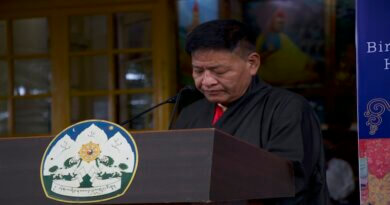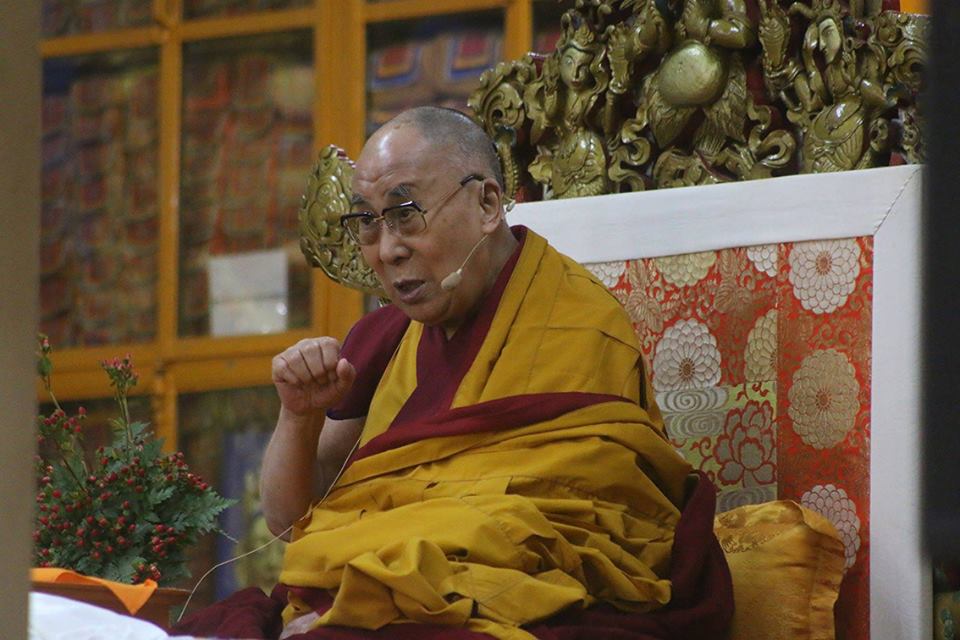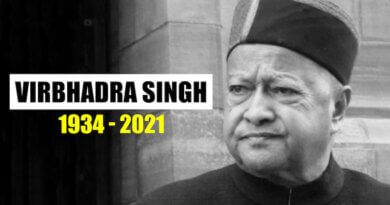Center for Middle-Way Initiative Marks 15th Anniversary

By Tsering Choephel
DHARAMSALA, 16 Sept: The Center for Middle Way (Umay Lam) Initiative, a non-governmental organisation, celebrated its 15th founding anniversary at the Tibetan Institute of Performing Arts (TIPA).
Samdhong Rinpoche, a former Kalon Trisur (Prime Minister) of the Central Tibetan Administration (CTA), was the chief guest of honour. The President of CTA, Penpa Tsering, and the Speaker of the Tibetan Parliament in Exile, Khenpo Sonam Tenphel, also attended the ceremony.
Lobsang Choephel, the President of the Center for Middle-Way Initiative, spoke about the organization’s objectives, stating, “The Middle-Way path is not only the vision of the Dalai Lama but also the consensus vision of the people formed through democratic means. Recognising that it’s a movement that citizens must engage in and work towards for the resolution of Tibet’s situation, this organization was established in 2008.”
He further said, “There isn’t a better or finer path than the Middle Way to find a resolution for our cause” and added, “We are directly serving the vision of the Dalai Lama and the CTA.”
Dawa Tsering, the Vice-President of the organization, addressed the lack of in-depth understanding of the Middle-Way path among the general public. He remarked, “Most people embrace the Middle-Way path based on their knowledge that it’s a path envisioned by the Dalai Lama and the political stance of the CTA.” He also mentioned that the committee’s recent conclusion regarding their future plans is “to create more awareness of the Middle-Way approach through workshops and conferences.”
Speaker Khenpo Sonam Tenphel clarified in his address, “It’s not a lack of public support for the Middle-Way approach or a deficiency within the approach. It’s also not a lack of international support for it. Instead, it comes down to our counterpart (China), with whom we must engage in dialogue to realize our set goal (Middle Way).” He called for continued efforts towards that goal with creativity.
Encouraging dialogues between different political stances, he said, “If non-governmental organizations could make efforts to create dialogues and discussion platforms for those with different political stances—Middle-Way and Independence—it would be beneficial for our cause.”
He also reflected on Tibetans’ experiences in dealing with the Chinese government, citing the nine years between 1951 and 1959 when the false promises of the CCP, encompassed within the 17-point agreement, eventually crumbled with the uprising of Tibetans, the escape of the Dalai Lama, and the subsequent horrors that engulfed Tibet.
In addition, he recalled how China launched an offensive attack on India in 1962, despite the Panchsheel agreement between India and China, which promised mutual respect for each other’s territory. He continued, “Those events occurred during Mao’s era. But in today’s time, we know what has happened to Hong Kong following its handover from Britain to China.
He emphasised the importance of careful thinking while putting trust in the Chinese government, concluding, “In a recent statement from the Dalai Lama, he mentioned that his trust in China is diminishing, though he still has trust in Chinese citizens.”
Sikyong Penpa Tsering, in addressing the potential confusion caused by Rangzen advocates hosting their conference and Umay Lam advocates hosting theirs, urged caution when sending representatives to attend events and functions from CTA. He emphasised the need to be mindful in future decisions to avoid unwanted and unnecessary misunderstandings, recognising the existence of differing political views and stands. He called for “everyone to remember our mutual counterpart and work towards it.”
Parliamentarian Geshe Gowo Lobsang Phende, the Representative of the Standing Committee of the Tibetan Parliament-in-Exile attendant the inaugural session of the 6th International Rangzen conference held in Delhi last month as the Guest of Honour.
Sikyong also emphasised the need to generate proper appreciation and respect for the Middle-Way Approach internationally. He acknowledged that China’s intense propaganda, claiming Tibet as an integral part of it, has affected the prestige of the Middle Way. He said, “Therefore, the Kashang has put special importance on highlighting Tibet’s independent past wherever we go to alleviate the prestige of the Middle-Way approach.”
During his brief address as the Chief Guest, Samdhong Rinpoche said, “The Middle-Way policy has been the CTA’s policy for 30 years in pursuit of a resolution to the Tibet issue. Until major global and internal changes occur within China, there is no alternative path.” He further declared that, apart from the Administration and its staff, each individual taking responsibility for the cause is indispensable.
A book titled “Umay Lam,” a compilation of essays on Umay Lam in Tibetan, was launched at the ceremony. The book has been compiled through an essay competition initiated by the Center for Middle Way Initiative to foster public engagement and awareness. The first publication includes the best 13 selected essays out of 29 submissions, and all 13 winners were awarded for their contributions.
The Middle Way Approach (Umaylam in Tibetan), conceived by the Dalai Lama and adopted unanimously as a policy by the Tibetan Parliament-in-Exile, is the official policy of the Central Tibetan Administration. The Tibetan government in exile has been seeking a mutually acceptable solution to the Tibetan issue with China through the Umaylam since 1974.
The Middle Way Approach does not seek independence, but genuine autonomy within the framework of the People’s Republic of China to ensure the survival of the Tibetan people with its distinct Buddhist cultural heritage and language and the natural environment of the Tibetan plateau.









